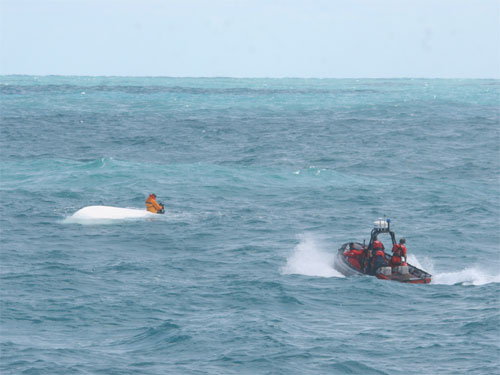Most of you have heard about the four football players who were recently involved in a Florida Boating accident. What you might not have heard is that, apparently two of them gave up hope and quit fighting to survive within a few hours of the boat capsizing. A third person eventually took his life jacket off and swam in an attempt to get help, while the fourth remained steadfast, clinging to the capsized boat. Unfortunately, this young man was the sole survivor of this catastrophe.
"As the Coast Guard ended its search for three missing football players whose boat tipped over in high Florida seas, the lone survivor said two of those lost gave up after hours in the frigid water and the third tried to swim to safety."
Why would people behave this way? The answer is fairly simple. When we humans experience fear, our central nervous system switches over to a high alert system that causes us to stop thinking rationally, and either fight, run or give up. Once a sense of despair and hopelessness encroach on a situation where you continue to be bombarded by wave after wave of stress, it becomes very difficult to hold on. Our problem solving brain (cerebral cortex) shuts down and our limbic system (oldest part of the brain) takes over.
Undoubtedly, facing high winds and seven to fifteen foot swells caused constant stress, both emotionally and physically. The human body can only take so much fighting before it exhausts its resources, especially with so much adrenaline pumping through the system.
So, how did the sole survivor hang on? He used the power of his brain to overcome his circumstances. He began an internal dialogue, repeating to himself:
"My mother is not going to attend my funeral."
He kept his mind on a central, rational thought, that guided every decision he made. In doing so, he kept his cerebral cortex working at least as hard as his limbic system.
So what does this mean for the rest of us? While our everyday crises may not compare to the perils these four men faced, current stressors can lead to similar reactions. Don't let yourself get stuck in fight or flight. Set goals daily, weekly, and monthly, and more importantly, stick to them. By doing so, you'll survive and eventually thrive.
If you do find yourself in a fight or flight scenario, by all means, fight! But, don't allow your circumstances to dictate your outcome. This applies in emergency situations as well as daily encounters. Engage your brain to take charge, choose hope…and hang on to your boat. There is always something better waiting.
Posting Comments: Have you ever posted a comment on a blog? If not, you should try it. It’s a fun way to get involved in the discussion and find out what others are thinking. If you’re a shy person or want to maintain a higher level of privacy, just use your first name or a screen name. Your email address will not be visible under any circumstances. We’ll all benefit from hearing your thoughts. To post a comment, click the comments tab below this posting.


